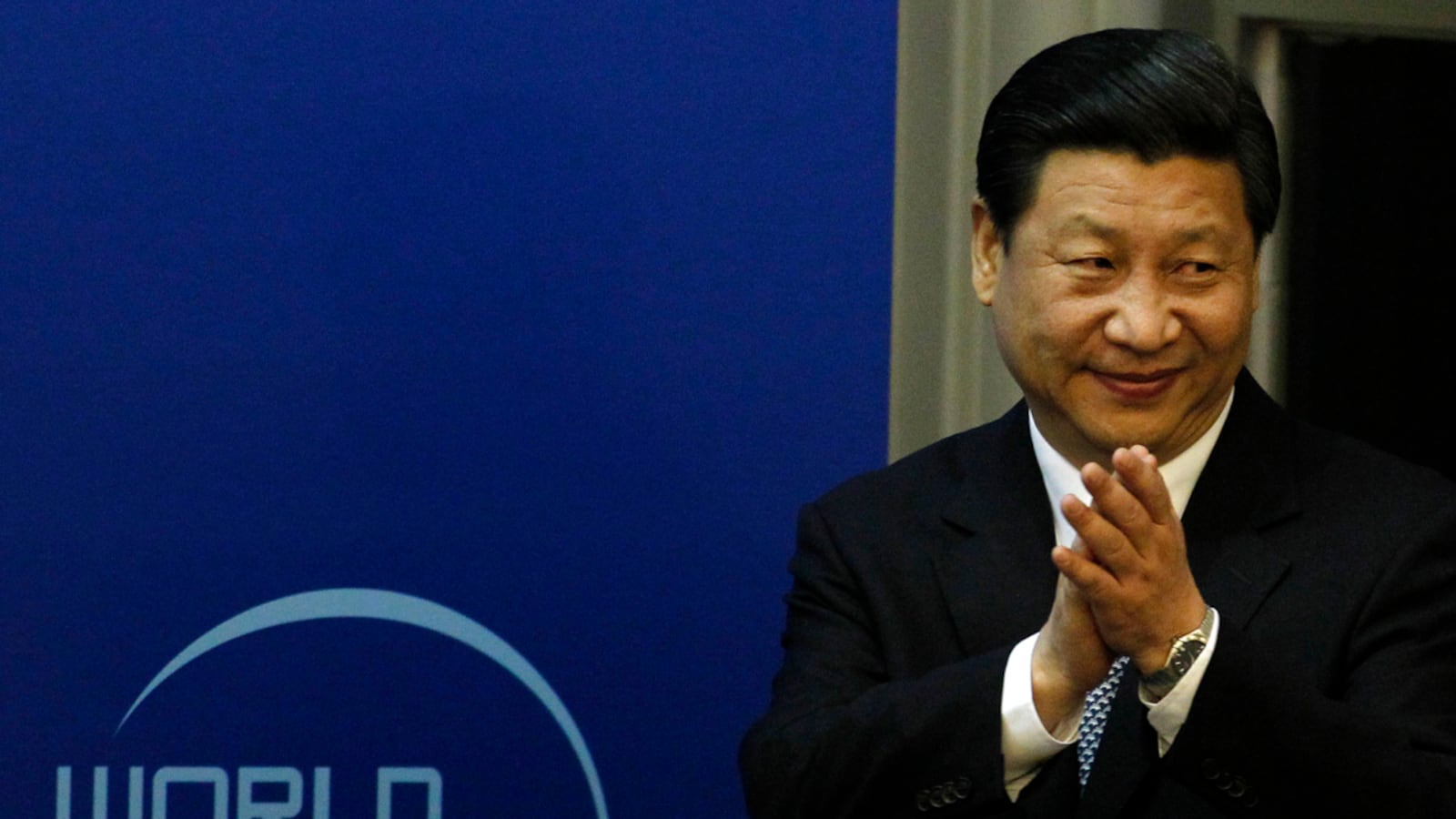What happened to Xi Jinping? After the unusual, week-long disappearance from public view of China’s vice president and heir apparent, the state of his health is, well, less than apparent.
Did Xi really suffer a minor strain to his back, as government officials insist? Is his ailment more serious—say, a heart attack or stroke or even Bell's palsy, which left his face looking contorted? Or was he the victim of a sensational, botched assassination plot, as some rumors suggested? Most important, does any of this affect the nervously awaited 18th Communist Party Congress, which will produce a once-in-a-decade leadership succession in which Xi is slated to move into the nation’s top job? And why will some suspicions about Xi’s status persist—even when (or if) he reappears?
Even in the West, the health status of top leaders has often been jealously guarded. There was Ronald Reagan’s Alzheimer’s, the severity of FDR’s polio (he never appeared publicly in a wheelchair though he used one in private), and JFK’s Addison’s disease and severe back pain. But in China, a leader’s disappearance from public view is often assumed to be a matter of political, as well as physical, health. Despite official attempts to enhance government transparency, opacity still reigns when it comes to the inside workings of the Politburo.
Which is why Chinese rumor mills shifted into hyper-drive when the nation’s leader-in-waiting skipped important meetings for more than a week, including Xi’s previously scheduled engagements with Secretary of State Hillary Rodham Clinton last Wednesday and the Danish prime minister on Monday. Conspiracy theories were already at a fever pitch in the wake of dramatic political scandals such as the purge of Politburo member Bo Xilai.
Why do many Chinese believe even the most outrageous speculation? Perhaps partly because sometimes the truth and the government’s own propagandistic version of events seem equally unbelievable. For example, it was the government’s own story that the late Great Helmsman Mao Zedong’s handpicked heir apparent, Lin Biao, who disappeared in September 1971, had died in a mysterious plane crash after an aborted coup attempt against his onetime mentor. The details behind the “Lin Biao Incident” remain murky even today.

Xi may reappear at any moment, putting some (though not all) the rumors to rest. Meanwhile, though, explanations for his absence—ranging from plausible to wild and wacky—continue to proliferate. Foreign-ministry officials said he suffered a minor back injury, though theories differ as to whether it was incurred while swimming or playing soccer, reportedly Xi’s favorite sport. When asked for further details about the nature of Xi’s injury, foreign-ministry spokesman Hong Lei said cryptically, “We have told everybody everything.”
The New York Times quoted an unnamed but well-connected political analyst in Beijing as saying Xi might have suffered a mild heart attack—though nothing serious enough to derail the party congress that’s expected to open in mid-October. Then, for the more superstitious wing of the rumor mill, there’s the report that Xi’s going AWOL coincided with a portion of the Yangtze River turning red, specifically near the metropolis of Chongqing, where the former party secretary Bo Xilai had been purged in March.
To round out the spectrum of speculation is a scenario, posted on the overseas website Boxun—which has become a clearinghouse for political rumors, some based on truth and others patently false. This rumor, which was quickly retracted, suggested that Xi was injured in a car accident orchestrated by powerful rivals bent on avenging Bo’s downfall. This scenario had it that another senior official, He Guoqiang, was injured in a second intentional car crash about an hour later, and that both He and Xi were ensconced at the 301 Hospital in Beijing. (He Guoqiang, who hasn’t been seen in public since Aug. 28, heads the party’s watchdog body, the Central Commission for Discipline Inspection; as such he is responsible for the nations’ anti-corruption drive and investigations into party members accused of violating party discipline, which so far is the only infraction of which Bo has been accused.)
The government’s opaque culture—especially when it comes to the senior leadership, but also in more routine matters—has exacerbated the regime’s credibility gap. Netizens exploded in outrage over the government’s unbelievably low initial death-toll report after recent flooding in Beijing; it later was revised upwards. Similarly, when a serial killer authorities had stalked for weeks finally was cornered and shot to death near Chongqing, microblogging sites exploded with “sightings” of the killer, still alive, and rumors that the corpse shown by Chinese media was not actually the criminal but instead a cop killed in the shootout.
With the mushrooming numbers of nosy microbloggers and citizens wielding cellphone cameras, meanwhile, some scandals born of rumor ultimately turn out to be rooted in truth. In a recent case, the charred remains of a fiery Ferrari crash in Beijing appeared on the Internet last March, and gossip swirled when authorities refused to identify the male driver and two female passengers—all reportedly in stages of undress. Last week, the Hong Kong–based South China Morning Post revealed the driver was the son of senior official Ling Jihua. That revelation only came after Ling Senior was shifted out of his powerful job in an apparent demotion, seen as a political blow to the faction of current President Hu Jintao, for whom Ling functioned as a sort of chief of staff.
And who can forget the rumors that proved to be true in the November 2011 murder of Briton Neil Heywood by Gu Kailai? The wife of purged Chongqing party boss Bo Xilai said the murder drama began over an economic dispute, then deteriorated into Heywood’s kidnapping of her son, and finally blackmail, which drove her to take extreme measures. Many Chinese believe the case only became public because foreign diplomats—through no prodding of their own—became privy to some of the gory details after Bo’s top cop, Wang Lijun, sought refuge in the U.S. Consulate in Chengdu last March. There, he told his startled American hosts that he feared his former boss, Bo Xilai, might kill him because he knew too much about Gu’s murder conspiracy. Wang’s revelations were ”eye-popping … like something out of a spy thriller,” U.S. Ambassador Gary Locke later told Newsweek.
What galled many Chinese was the fact that Gu “apparently believed she would enjoy total impunity” when she poisoned Heywood, wrote Hu Shuli, editor of Caixin magazine. When four Chongqing police officials tasked with investigating Heywood’s death discovered Gu was the prime suspect, they proceeded to help her cover it up, said Hu, “making them look more like Bo’s personal flunkies than public law-enforcement officers.”
In court Gu, who received a suspended death sentence, had appeared chunkier and puffier than she’d seemed in earlier public appearances, when, as an intelligent and attractive Politburo wife, she was nicknamed “China’s Jackie O.” The startling contrast—which could be explained by her incarceration and regimen of medications for depression—led to Internet gossip that Gu had been replaced by a “body double” paid to stand trial and do hard time in prison in place of the genuine defendant.
The “body double” rumors actually are based on the fact that well-connected officials, members of the wealthy elite, and mafia figures, sometimes really have hired surrogates to take their place in prison.
As this year’s scandals suggest, many citizens refuse to discount the churnings of the rumor mill, regardless of how incredible, because they know that in China truth can be stranger than fiction. And everyone is waiting to see where the truth about Xi Jinping lies.






